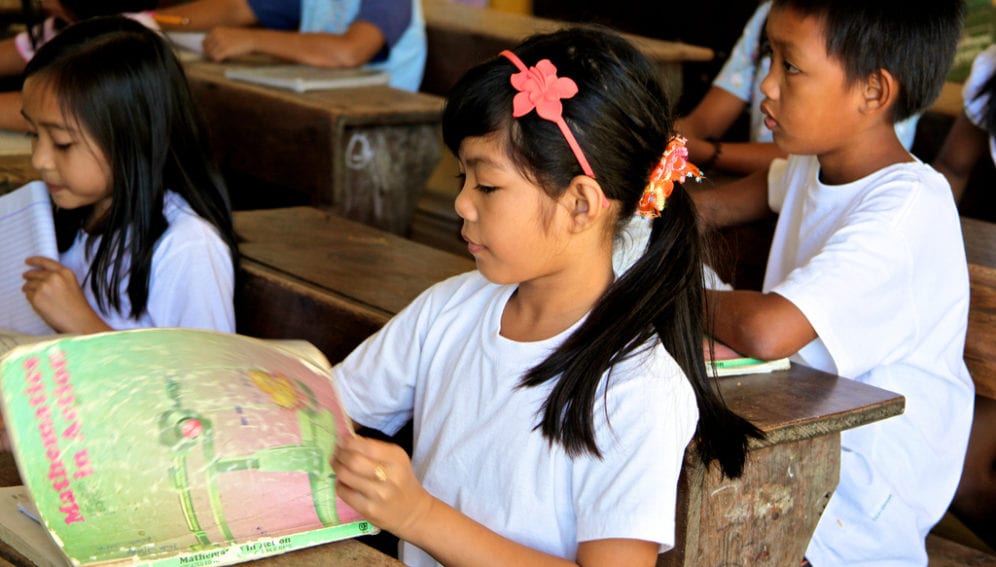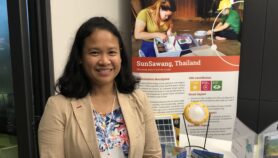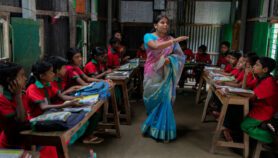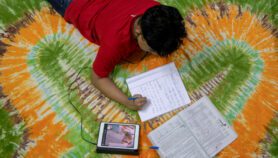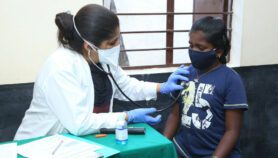Send to a friend
The details you provide on this page will not be used to send unsolicited email, and will not be sold to a 3rd party. See privacy policy.
[BARCELONA] Mobile phone applications unveiled this week aim to reduce the high number of young people who are not in schools in the Philippines by offering them new ways to engage in education.
The apps, which were presented this week at the Mobile World Congress (24-27 February) in Barcelona, Spain, include a portal to help those outside education find courses near them, an app to teach English to out-of-school teenagers through phone calls and another app to help teachers track the progress of students taking such courses.
In 2011, more than six million young people were outside the education system in the Philippines, according to the country’s National Statistics Office. The nation’s Department of Education aims to provide education to at least one million of them in 2014.
The government is confident it will meet this target partly through the use of mobile technology, Stephanie Velasco-Orlino, education programme manager at Filipino mobile operator Smart Communications, tells SciDev.Net.
Mobile phones are widely used in the Philippines, with the population reported to send around two billion text messages a day, according to the Philippines — Telecoms, Mobile, Broadband and Forecasts report published in June 2013 by telecommunications consultancy BuddeComm.
Overall, Asia’s mEducation market is projected to reach a value of US$6.8 billion by 2017, according to the GSMA, an association that represents mobile operators worldwide.
“Mobile network operators are working to provide mobile education services to help the government reach their goal faster.”
Stephanie Velasco-Orlino, Smart Communications
The three mobile applications unveiled this week are the result of a GSMA-facilitated partnership between the Philippines’ Department of Education and three telecommunications firms: Globe Telecom, Digital Mobile Philippines and Smart Communications.
“The mobile network operators in the country … are working to provide mobile education services to help the government to reach their goal faster,” says Velasco-Orlino.
Her company has just launched an online portal that allows young people who are not in school to find tailored training programmes.
Smart Communications also aims to build a database of its users so it can find out where these young people are located and tell them about courses that nearby education centres offer. This could help potential students find information on where to go to school, given a general lack of infrastructure and the destruction caused by typhoons.
The system is due to be available in the second quarter of 2014 both for smartphones with an internet connection and for older phones, through an interactive voice response (IVR) system.
Meanwhile, Globe Telecom has announced an IVR system-based app that provides English lessons.
“You can use any mobile phone, call our application as if you were making a standard phone call and get lessons in English [at different levels of] proficiency,” Miguel Bermundo, senior specialist for corporate social responsibility at Globe Telecom, tells SciDev.Net.
The application, which is still in its pilot phase, offers lessons in pronunciation, conversation and comprehension. Bermundo says the lessons include teaching, practice sessions and tests.
The developers hope to reach one million young people with their lessons by the end of 2014. This will improve students’ employability for posts that do not require a college degree, but do require English language proficiency, for example those at call centres, Bermundo reckons.
“Many of the young people that we are targeting are located in rural areas in the Philippines, where data and online connectivity are very poor, so we are going back to the available technology there, which is the use of any mobile phone,” says Bermundo.
The third new application, developed by Smart Communications and Digital Mobile Philippines, is designed to help teachers track the progress of students who are taking IVR courses through phone calls. This app runs on smartphones or tablets, because teachers are more likely to have access to those devices.


